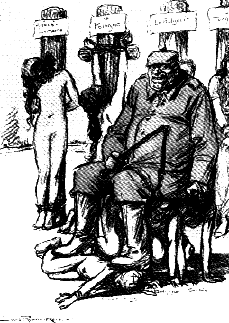The Hummingbird
Robert Burton
(Firefly)
In a cowslip's bell I lie;
There I couch when owls do cry.
On the bat's back I do fly
After summer merrily:
Merrily, merrily shall I live now
Under the blossom that hangs on the bough.
 The hummingbird exists only in the New World, and was a source of much interest and study by those who came from the Old. One naturalist wrote, "'Tis an exceedingly little bird, and seen only in summer ... flying from flower to flower, sucking with its long bill a sweet substance." Another claimed that hummingbirds ate not nectar but bees, using the sharp bill "which is like the poynt of a Spanish needle but shorter."
The hummingbird exists only in the New World, and was a source of much interest and study by those who came from the Old. One naturalist wrote, "'Tis an exceedingly little bird, and seen only in summer ... flying from flower to flower, sucking with its long bill a sweet substance." Another claimed that hummingbirds ate not nectar but bees, using the sharp bill "which is like the poynt of a Spanish needle but shorter." If you favor these charmers, The World of the Hummingbird has all the information you could ever want about them:
It's all good simple writing here, something that birdbrains like us can understand. The seven chapters tell about hummingbird flying abilities, their social lives, nesting, relations with humans, and their travels. There are almost a hundred gorgeous color live in-action hovering supping pictures to tantalize you.

Feathers:
In Search of the
Birdmen of Peru
Tahir Shah
(Arcade Publishing)
We can choose to suspend disbelief when Shah gives his reasons for this quest, and accept Trail of Feathers for what it is: the ooey-est, gooey-est book to happen in a long, long time. Forget flying men; this book is about mummies. Body fluids float through this narrative over a sea of bones, with our genial host as captain.
Shah is attending a shrunken head auction ("the shrunken head business is a small one," he notes) when he first hears of ancient Incas said to fly like birds. His next informant is a retired cash-register repairman who claimed to manufacture flying carpets, or alternatively, flying doormats. Based on such ephemeral evidence, Shah flies off to Peru and suffers many a hardship before concluding his unlikely quest.
You have to admire him, even as you question his good judgment. Clearly this birdman thing is just an excuse to travel, and his naiveté and charm are the best equipment he could take. He is appealingly boy-like as he treats us to Astounding Facts: the use of mummy dust as medicine, the specifics of anointing oneself with a guinea pig, encounters with bugs the size of a puppy. And there is a crazy comic-book quality to the crew he assembles on the stinking, sinking boat he hires to take him up the Amazon: a shaman in droopy underwear, a cook named "Cockroach" and a mystical Vietnam vet.
If all this seems more like entertainment than adventure, well, we will not see the likes of Sir Richard Burton in a world where you can book a week's visit with a primitive African family on the Internet. If you like your macabre well-done, Shah is an engaging companion.
Englishman's
Daughter
Ben Macintyre
(Farrar, Strauss and Giroux)

He is described as a man of "limited imagination, casual cruelty, and obsession with bureaucratic minutiae." In a series of edicts, he not only presented the French with constant demands for food, but he also introduced restrictions of unnecessary harshness and listed the retributions that would fall on those who protected the enemy soldiers he knew to be somewhere in the village.
Digby was able to escape capture for so long not by hiding but, rather, by dressing up as a farmer and working in the fields. As time went on, and as the food became more and more limited, all suffered more by protecting (and feeding) Digby and his compatriots. One day, after one of the villagers denounced them, Digby gave himself up to protect those who had protected him. He was shot by order of Evers on 30 May 1916.
The Englishman's Daughter is a moderately interesting story of survival. At first, the villagers saw the English as heroes; but as time went on, some of the Germans came to be seen less as Huns and more as humane. As Macintyre goes through the ancient documents, he finds himself caught up in the passion of it, and begins his own search for those who gave the Englishmen away.
He solves, he believes, the question of who and why and how: but since we are dealing with but a tiny facet of the human earthquake known as WWI, the excitement lies not in his detective work, but with his expert handling of the details of two years in a small subset of a much larger conflict, and the details of how enemy occupation can rob not only the spirit but the honor of the citizens of a small provincial village. For instance, there is matter of Digby's boots.
After the execution,
the eye of one member of the firing squad came to rest on the dead soldier's shiny boots. "They were beautiful brown boots, brand-new," remembered the carpenter, Ernest Lambert.
The German began to unlace them, Lambert slammed down the lid of the coffin, and "In a rage, the soldier kicked me hard in the kidneys: I felt pain for ages afterwards." However,
The hunchback carpenter later admitted what everyone in the village knew: that he had taken the boots himself. "They were precious things at the time."